
Brigid Antonia Brophy, Lady Levey was a British writer and campaigner for social reforms, including the rights of authors, and animal rights. The first of her seven novels was Hackenfeller's Ape (1953), a story concerning the ethics of sending a captive ape, Percy, into space. Brophy's The Snow Ball (1964), is considered her masterpiece: set at a costume ball on New Year's Eve, it is a glittering piece which weaves together sex, death and Mozart. In Transit (1969), is her most radical fiction in form and handling, and was in the vanguard of gender-fluid literary conceptualisations. The novel is considered to be a pioneering work of post-modernism and an iconic feminist surrealist fantasia.
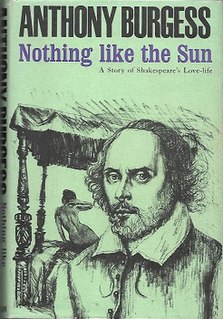
Nothing Like the Sun is a fictional biography of William Shakespeare by Anthony Burgess first published in 1964. It tells the story of Shakespeare's life with a mixture of fact and fiction, the latter including an affair with a black prostitute named Fatimah, who inspires the Dark Lady of the Sonnets. The title refers to the first line of Sonnet 130, "My mistress' eyes are nothing like the sun", in which Shakespeare describes his love for a dark-haired woman.
Literature written in the English language includes many countries such as the United Kingdom and its crown dependencies, Republic of Ireland, the United States, and the countries of the former British Empire. The English language has developed over the course of more than 1,400 years. The earliest forms of English, a set of Anglo-Frisian dialects brought to Great Britain by Anglo-Saxon invaders in the fifth century, are called Old English. Beowulf is the most famous work in Old English, and has achieved national epic status in England, despite being set in Scandinavia. However, following the Norman conquest of England in 1066, the written form of the Anglo-Saxon language became less common. Under the influence of the new aristocracy, French became the standard language of courts, parliament, and polite society. The English spoken after the Normans came is known as Middle English. This form of English lasted until the 1470s, when the Chancery Standard, a London-based form of English, became widespread. Geoffrey Chaucer, author of The Canterbury Tales, was a significant figure in the development of the legitimacy of vernacular Middle English at a time when the dominant literary languages in England were still French and Latin. The invention of the printing press by Johannes Gutenberg in 1439 also helped to standardise the language, as did the King James Bible (1611), and the Great Vowel Shift.
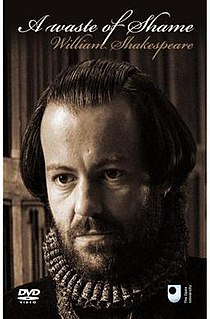
A Waste of Shame is a 90-minute television drama on the circumstances surrounding William Shakespeare's composition of his sonnets. It takes its title from the first line of Sonnet 129. It was first broadcast on BBC Four on 22 November 2005 as part of the supporting programming for the BBC's ShakespeaRe-Told season, but was only loosely connected to the rest of the series.
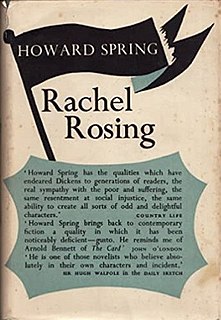
Rachel Rosing is a 1935 novel by the British writer Howard Spring. It is the sequel to Shabby Tiger, published the previous year (1934).

John Brophy was an Anglo-Irish soldier, journalist and author who wrote more than 40 books, mostly based on his experiences during World War I.
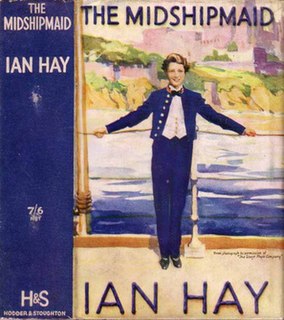
The Midshipmaid is a 1933 comedy novel by the British writer Ian Hay. It is based on his 1931 play The Midshipmaid, co-written with Stephen King-Hall, about the visit of an economic expert to the British fleet to see what cuts can be made and the adventurous flirtation of his daughter with the ship's officers.
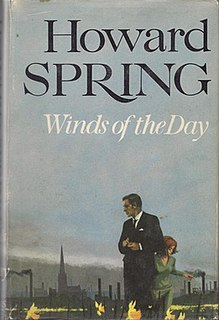
Winds of the Day is a 1964 novel by the British writer Howard Spring. It was Spring's final novel.
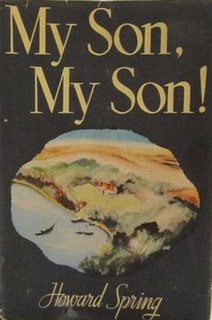
My Son, My Son is a 1938 novel by the British writer Howard Spring.

Time and the Hour is a 1957 novel by the British writer Howard Spring. It is set in the Bradford area. The title is taken from a line of Shakespeare's Macbeth.
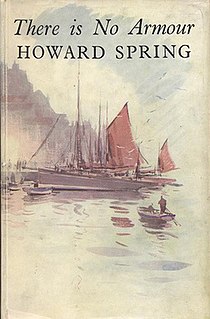
There Is No Armour is a 1948 novel by the British writer Howard Spring.
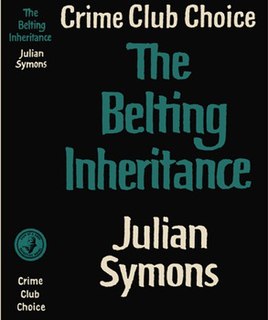
The Belting Inheritance is a 1965 mystery detective novel by the British writer Julian Symons. It is a traditional country house mystery harking back towards the Golden Age of Detective Fiction. It was republished by British Library Publishing in 2018 along with another Symons novel The Colour of Murder.

If the Gods Laugh is a 1925 romantic adventure novel by the British writer and explorer Rosita Forbes. It is set against the backdrop of the Italian colonization of Libya.

The Paper Chase is a 1956 mystery crime novel by the British writer Julian Symons. It was published in America the following year by Harper & Brothers under the alternative title of Bogue's Fortune. It was reviewed by fellow writers Milward Kennedy in The Guardian and Philip John Stead in the Times Literary Supplement.

The Woman in the Hall is a 1939 novel by the British writer Gladys Bronwyn Stern. The lifestyle of a confidence trickster mother has a psychologically disturbing effect on her daughter who she uses as an essential part in her various swindles.

The Day They Robbed the Bank of England is a 1959 crime novel by the British writer John Brophy.

Turn the Key Softly is a 1951 novel by the British writer John Brophy. It follows the lives of three women in the first dozen hours after they are released from prison.

Immortal Sergeant is a 1942 war novel by the British writer John Brophy. The novel is set during the North African campaign of the Second World War and seen through the eyes of a British corporal fighting across the Libyan desert whose comrade, a sergeant, is killed.
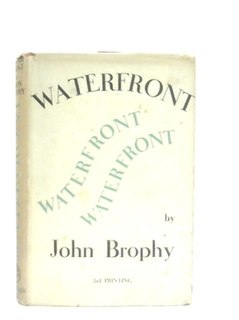
Waterfront is a 1934 crime drama novel by the British writer John Brophy. It is set in his native Liverpool amongst the world of dockworkers.

Target Island is a 1944 war novel by the British writer John Brophy. It was published by Collins in London and Harper in New York. It takes place during the Axis Siege of Malta during the Second World War. While popular, it did not repeat the great success of Brophy's previous novel Immortal Sergeant set during the North African Campaign. John Hampson writing in The Spectator gave it a fairly negative review alongside Vicki Baum's Berlin Hotel and noted "here again are major and minor figures, love-affairs, raids, and alarms, amid the panoply of modern war. And yet nothing has been added to the epic of Malta that we didn't already know. However, its film possibilities will be obvious to the cinema fan". In the event the novel was not adapted for the screen unlike several others of Brophy's work, although much of its settings and themes featured in the 1953 film Malta Story.



















